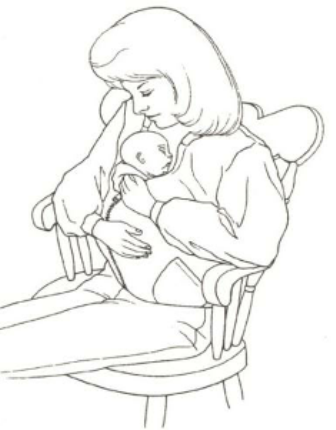Neonatal Abstinence Syndrome
Neonatal Abstinence Syndrome (said like: ne o NAY tul AB sti nence SIN drome) (NAS) is a condition that starts at birth when a baby’s mother has used drugs (legal or illegal) or alcohol during her pregnancy. When the baby is born, the child’s drug supply stops and he or she goes through a time of withdrawal. Until the drugs have passed out of the baby’s system, he or she feels discomfort like an adult who suddenly stops using drugs (known as “cold turkey” withdrawal).
Signs of Withdrawal
The withdrawal signs a baby has depends on what drugs mom used, how much she took of the drug, and how often she took the drug during pregnancy. One or more of the following can be signs of withdrawal:
-
High-pitched cry
-
Shaky (tremors)
-
Cranky, restless
-
Hard to get or keep asleep
-
Feeding problems
-
Overactive sucking
-
Diarrhea or frequent stools
-
Vomiting
-
Severe diaper rash
-
Stuffy nose or sneezing
-
Skin irritation of face, heels
-
Stiff baby
-
Patchy color of skin
-
Sweating
-
Fever
-
Yawning
-
Seizures (convulsions)
-
Dehydration
-
Poor weight gain

Some babies have mild signs of withdrawal and need only normal newborn baby care. Others can have severe withdrawal and need medical treatment. This may include being admitted to a special care nursery where they can receive medicine to help ease their discomfort. If your baby is admitted to the special care nursery, he or she will be watched for these signs and scored using a tool developed to assess the severity of your baby’s withdrawal. This score will help the health care team decide what kind of care your baby needs.
Things You Can Do
There are many things you can do to help your baby in the hospital or at home:
-
Spend as much time with your baby, in the nursery or at home, as possible. Your baby will be comforted by your close contact.
-
Hold your baby close. You might use Kangaroo care (skin-to-skin).
-
Some babies like to be patted or rocked, while others do not. Know if your baby likes or dislikes being patted or rocked.
-
Give a pacifier.
-
Keep a calm and quiet environment. Keep lights dim, TV and radio off, and use soft, quiet voices.
-
Use a blanket to wrap your baby, but be careful not to overheat.
-
Give smaller, more frequent feedings.
-
Change your baby’s diaper often. Clean his skin with warm water.
-
Learn the signs of withdrawal so you will know if your baby is getting worse.
-
Keep in contact with the doctor.
What to Watch for at Home
-
Your baby’s withdrawal symptoms getting worse.
-
Your baby’s withdrawal symptoms coming more often.
-
Your baby’s behavior changing and is concerning.
-
Your baby is not eating.
-
Your baby is having diarrhea or is throwing up.
-
You are not able to calm your baby.
Activity
Babies, who have NAS, are very sensitive to stimulation, like bright light, loud sounds, and being moved or held often. Keep things calm and quiet around your baby.
Diet
-
If you are not breast-feeding, the doctor will tell you what formula is best for your baby.
-
If your baby needs a special formula to make digestion easier, the doctor will tell you.
-
Make sure to not over-feed your baby. This could lead to loose stools or spitting up.
-
Sometimes babies need to suck but not to eat. A pacifier may be good for this.
Medicine
If your baby’s doctor has prescribed medicine to help the withdrawal, give the exact amount. If you forget to give a dose, give it as soon as you remember. Do not give two doses of this medicine at the same time. Give only the amount of medicine that the doctor prescribes.
Your baby’s doctor will prescribe more or less medicine depending on your baby’s needs.
If you have any questions, please call the doctor or nurse at (phone) _________________.
Follow-Up
It will be important to watch your baby’s development as they grow and to discuss any concerns you may have with your baby’s doctor. Children who have been treated for NAS in a special care or intensive care nursery may be referred to the Neonatal Developmental Clinic for more specialized care. This clinic will screen your baby to make sure he or she is developing normally. The screening is done by doctors, nurses, and occupational and physical therapists that are trained to take care of babies and toddlers.
When to Call the Doctor
Call your child’s doctor if:
-
Your baby’s signs of withdrawal get worse.
-
Your baby is not eating.
-
Your baby is having diarrhea or vomiting.
-
Your baby cannot be calmed down.
When to Call for Emergency Help
Call 911 for emergency help if:
Please ask for the following Helping Hands for more information:
-
Kangaroo Care for Your Infant, HH-I-191
-
Calming a Fussy Baby, HH-IV-74
-
C olic, HH-I-103
-
Phenobarbital for NAS, HH –V-234
-
Morphine for NAS, HH – V- 237
-
Methadone for NA, HH – V -259